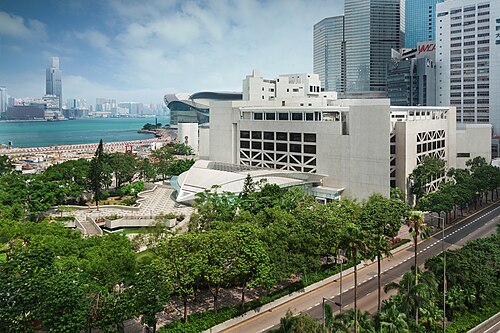David Stone’s work for music throughout the community of Hong Kong established the political raison d’être, with popular grassroots support, for his next initiative. This enabled him to submit the report ‘Some Thoughts on an Outline Cultural Policy for Hong Kong’ (1979) and the concept of an international training centre for the performing arts at tertiary, professional level.
In 1979 the Governor decided to initiate the project (at an estimated capital construction cost of 370M HKD / US$ 73M, at 1979 prices and not allowing for inflation) and directed that the first intake of students was to be in autumn 1985. In 1981 the Royal Hong Kong Jockey Club formally announced plans to build the Academy on a piece of vacant land in Wan Chai, granted by the government. The capital cost was met mainly by the Jockey Club; the government agreed to meet the recurrent costs as well as contributing in part to the capital cost. Both the timescale and the budget were achieved: the Administration Block and the Academy Block were opened in 1985; the Theatre Block was opened by the Duchess of Kent in early 1986. The management of the building work was undertaken by the Jockey Club; David as Artistic Advisor to Government, was a member of the three-man Project Executive Team, charged with delivery of the project.
For full details of the expansion and development of the HKAPA since inception, see https://www.hkapa.edu/ and https://en.wikipedia.org/wiki/Hong_Kong_Academy_for_Performing_Arts

The architects, Simon Kwan and Associates, were chosen by an architect selection panel (on which David sat), under the auspices of the Jockey Club, following a competition limited by invitation for six companies working in Hong Kong, using international consultants. The construction company was selected under the same process. Dr Kwan’s uniquely innovative design expressed David’s insistence that the building itself should reflect the concept of the integration of the four disciplines. The design won the Annual Award of the Hong Kong Institute of Architects and the HKAPA is the only Hong Kong building to be mentioned in the 20th edition of Banister Fletcher’s classic A History of Architecture (Oxford University Press) and the prestigious Complete Book of Chinese Modern Art.
This tertiary, degree-awarding (from 1996) and diploma-awarding institution is housed in a highly specialised integrated building embracing the four disciplines – of music, dance, drama, and technical arts – attracting students primarily from South-East Asia and Australasia. This was the first time ever that the four disciplines were combined in one overarching institution. David’s concept recognised the need for excellence in each separate art, but enabled the creative potential of combination between the arts and the sharing of experience between the students.
David Stone was responsible for many aspects of the both the concept and practical development of the HKAPA. As Artistic Advisor to the Government and member of the Project Executive Team, in a series of reports to government he assisted in formulating the capital and recurrent budgets; drawing up the user specifications used for the architect’s brief; the specialist staffing structure; and the educational policy.
To enable him to undertake these reports, he visited USA, Canada, the UK, Austria, Italy, South Korea to study prestigious educational arts institutions, theatres and other performing venues that offered music and at least one other artform, as well as calling on his previous experience as an international performer. Having analysed architectural plans and specifications for some 49 buildings, theatres, and storage amenities (such as an opera costume centre in Italy), he drew up the highly detailed user specifications (spaces, equipment and people flow).
“… the most successfully functional arts building for the performing arts in the world …”
Sir Ronald Grierson, Inaugural Chairman of London South Bank Centre 1984–1990 (verbal communication)
For the educational policy and staffing requirements, he convened and chaired a series of meetings in Hong Kong (assisted by Dr Ken Robinson, Professor of Education Warwick University, as rapporteur), selecting some 17 advisors, chosen by repute and from personal contact, representing leading international arts foundations and institutions from Australia, Austria, China, the UK and the USA (including Hawaii). The advisors visited in four groups (music, drama, dance and technical arts), each group visiting separately for a period of ten days. They worked to David’s annotated agenda of 70 discussion items, the same agenda for each group. Apart from structured meetings, the advisors were available for personal discussion and advice and for experiencing Hong Kong.
The Academy continues to flourish and expand today. In 2023, the QS University Rankings for Performing announced the HKAPA 1st in Asia and 13th in the world. The Academy’s vitality, its ever-increasing expansion and effect, is a symbol of the creative spirit of Hong Kong’s people.
With the HKAPA in mind, David undertook his final commission in Hong Kong, specifying the objectives and procedures for a Council for the Performing Arts, to provide an arm’s length mechanism for government involvement in the arts.
